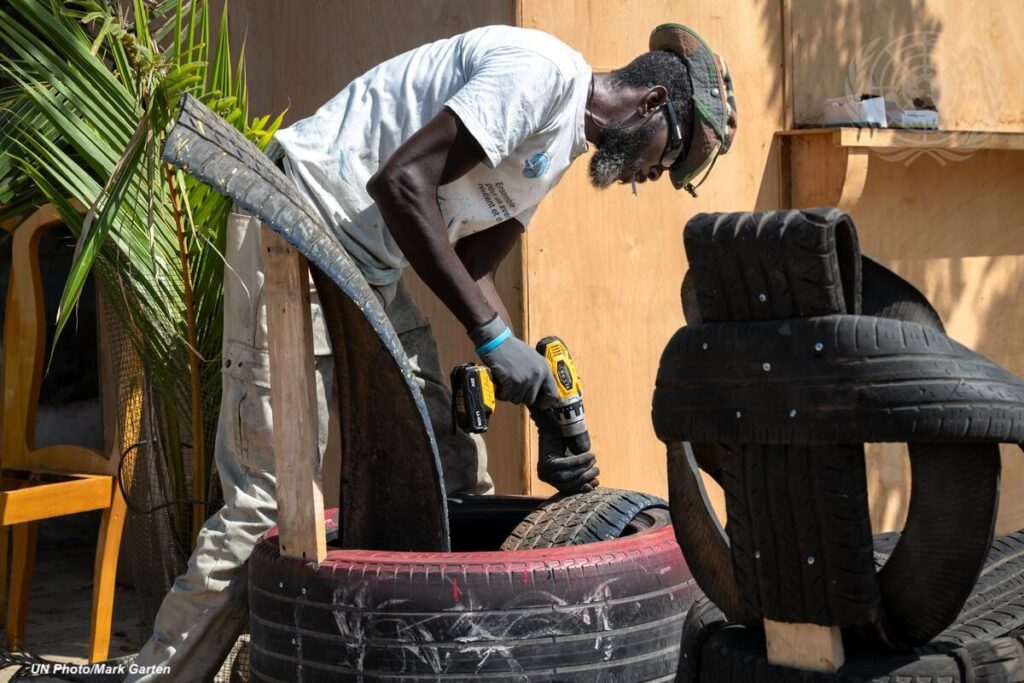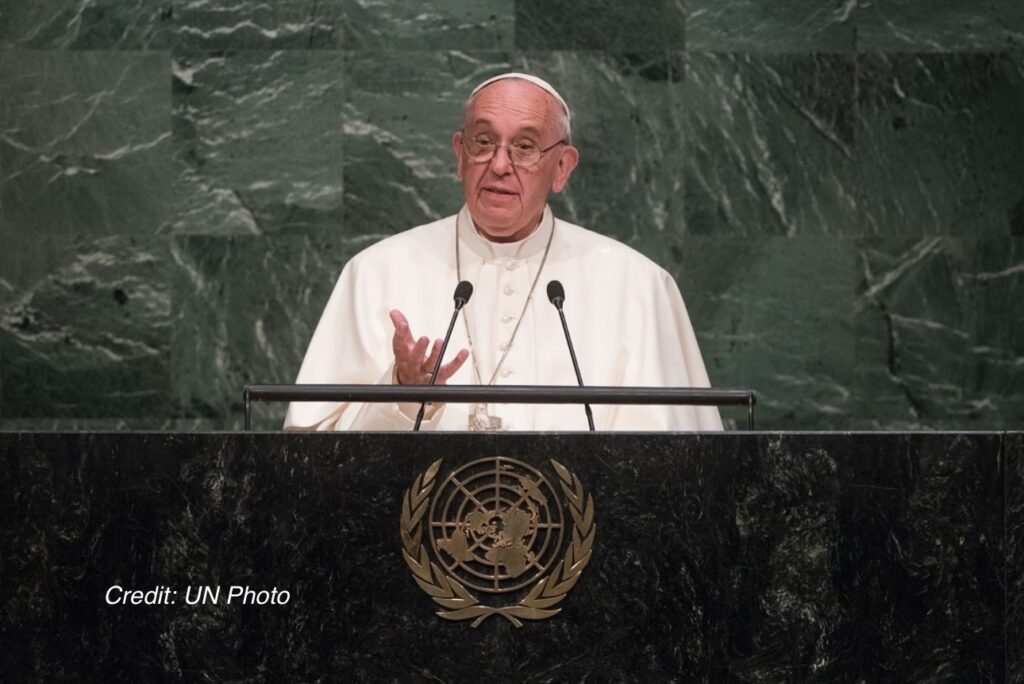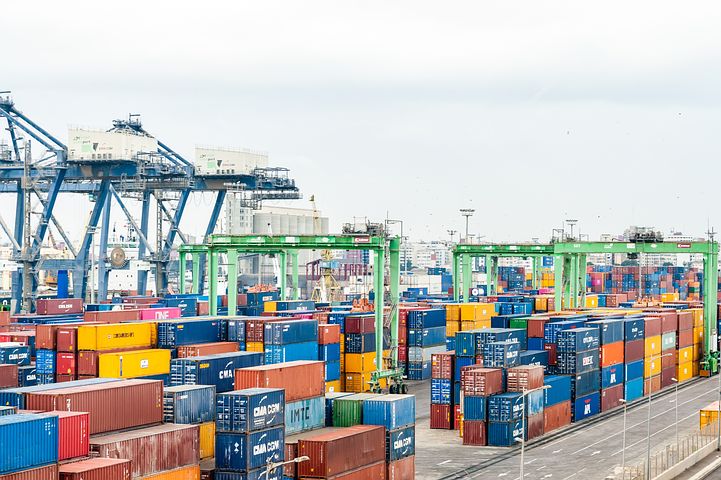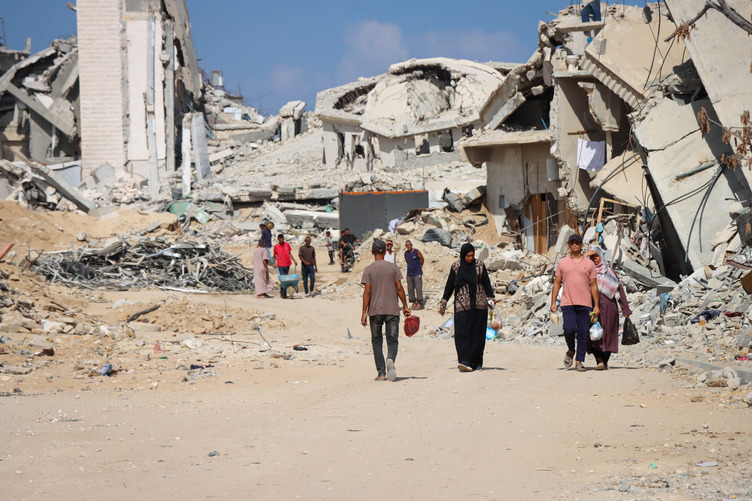Geneva/New York, 7 April, 2025 – Top United Nations officials today called on the world to act with urgency to save Palestinians in Gaza in a statement co-signed by the Under-Secretary-General for Humanitarian Affairs and Emergency Relief Coordinator, Tom Fletcher – as well as the heads of UNICEF, the UN Office for Project Services (UNOPS), the UN Relief and Works Agency for Palestine Refugees in the Near East (UNRWA), the World Food Programme (WFP) and the World Health Organization (WHO).
(Note: This Daily News Update from the Office for the Coordination of Humanitarian Affairs provides an update on the situation in Israel and the Occupied Palestinian Territory, Myanmar, Democratic Republic of the Congo, Yemen, Ukraine, Haiti and Sudan) Media contactS: In New York: Eri Kaneko, kaneko@un.org, +1 917 208 8910 – In Geneva: Jens Laerke, laerke@un.org, +41 79 472 9750
“For over a month, no commercial or humanitarian supplies have entered Gaza,” they said. “More than 2.1 million people are trapped, bombed and starved again, while, at crossing points, food, medicine, fuel and shelter supplies are piling up, and vital equipment is stuck.”
Although the latest ceasefire allowed humanitarians to see that life-saving supplies reached nearly every part of Gaza, the UN officials said assertions that there is now enough food to feed all Palestinians in the Strip are far from the reality on the ground, and commodities are running extremely low.
“With the tightened Israeli blockade on Gaza now in its second month, we appeal to world leaders to act – firmly, urgently and decisively – to ensure the basic principles of international humanitarian law are upheld,” they said. “Protect civilians. Facilitate aid. Release hostages. Renew a ceasefire.”
Today marks one and a half years since the 7 October 2023 attacks on communities in Israel.
Eighteen months on, the UN is as appalled – as it was then – by those horrific actions. Dozens of hostages remain in captivity, with no opportunities for visits and extremely concerning reports of mistreatment.
As the UN has said repeatedly, nothing can justify the torture, killing, maiming and abduction of civilians, nor the use of sexual violence or the launching of rockets towards civilian targets.
The UN reiterates once again that all hostages must be released immediately and unconditionally. Until then, they must be treated humanely, and Hamas must allow the International Committee of the Red Cross to visit them.
Across Gaza, Israeli attacks continue unabated, causing systematic, large-scale civilian casualties. People – including many children – are being killed, injured or maimed for life.
Survivors throughout the Strip are being displaced repeatedly and forced into an ever-shrinking space, where their basic needs cannot be secured.
Just yesterday, following Palestinian rocket fire into Israel, another Israeli displacement order was issued, this time for over 3 square kilometres in Deir al Balah. The location included nine neighbourhoods, with several medical facilities serving people inside or just outside that area.
Overall, nearly 390,000 people are estimated to have been displaced yet again since the breakdown of the ceasefire. That’s 18 per cent of all Palestinians in Gaza. No arrangements to secure their safety and survival have been made – a responsibility that falls to Israel, as the occupying power in Gaza.
In a statement issued for World Health Day, WHO said Gaza continues to be one of the most dangerous places to be a child and a place where pregnancy is clouded by fear.
WHO warned that the aid blockade is deepening the hunger and malnutrition crisis in the Strip, leaving families without clean water, shelter and adequate healthcare, and increasing the risk of disease and death.
Supplies are critically low in stock, including those needed for cesarean sections, anesthesia, intravenous fluids, antibiotics and surgical sutures, as well as blood units. Other equipment and medicines that have not been allowed in include incubators, ventilators for neonatal intensive care, ultrasound machines and oxygen pumps, along with 180,000 doses of routine childhood vaccines.
The UN continues to distribute what remains inside Gaza to those most in need, but the humanitarian community cannot sustain this for much longer unless the crossings are opened for supplies essential for people’s survival. The UN Office for the Coordination of Humanitarian Affairs (OCHA) says all attempts to pick up commodities that had been brought in and dropped at these crossings have been denied.
OCHA notes that coordination with the Israeli authorities is required for any humanitarian organization to access vast areas within the Gaza Strip, with most attempts to coordinate these movements resulting in access being denied.
Just yesterday, the Israeli authorities denied five of nine attempts to coordinate access by UN aid workers. OCHA reports that while staff rotations are often facilitated, aid delivery is regularly blocked. These denials prevent humanitarians from carrying out tasks as critical as the delivery of chemicals to run desalination plants.
Despite extremely challenging conditions and rapidly shrinking humanitarian access, WHO reported that the agency reached Al Ahli Hospital in northern Gaza on Friday. This facility is again overwhelmed, with only three operating theatres and an emergency unit that is pushed to eight times its capacity. WHO noted that of the 160 available blood units there, 50 were used in a single day, leaving stocks critically low. The hospital’s CT scanner – the only one in northern Gaza – has broken down due to sustained overuse.
To address the surge in trauma cases at Al Ahli, WHO supported the deployment of an international orthopedic emergency medical team to the hospital. WHO is also supporting the improvement of trauma care pathways to enable patient transfers to Al Shifa Hospital.
Myanmar
UN scales up response for quake-hit communities in Myanmar
The UN estimates that more than 17 million people are living in the areas affected by the two earthquakes that hit Myanmar on 28 March. Over 9.1 million live in the hardest-hit areas.
According to publicly available figures, more than 3,500 people have died, nearly 5,000 have been injured, and over 200 people remain missing nationwide. Communities in the worst-affected areas continue to grapple with widespread destruction of homes, health facilities and critical infrastructure, as well as prolonged power and water outages. Telecommunications are severely limited, and transport routes have been damaged or obstructed.
People left homeless by the earthquakes are enduring heavy rains, which have already started in Mandalay – posing an additional threat to those sheltering in the open.
While the time window for finding survivors has significantly narrowed, rescue teams continue their efforts to recover those who perished. The response is now shifting to relief and early recovery, as many remain displaced and struggle to meet their most basic needs.
Assessments are ongoing, and the UN is rapidly scaling up response efforts*. Emergency assistance, including food, has been provided to some 70,000 affected people Mandalay region, Nay Pyi Taw territory, Sagaing region and southern Shan State. Drinking water has been provided to over 40,000 people and hygiene kits distributed to more than 100,000 people.
The UN and its partners have reached more than 165,000 people so far with essential relief assistance. This includes the distribution of shelter materials, safe water solutions, hygiene kits and food. Mobile medical teams are being deployed.
Tom Fletcher, the Under-Secretary-General for Humanitarian Affairs and Emergency Relief Coordinator, has wrapped up his visit to Myanmar, where he met with communities impacted by the disaster and humanitarian responders.
In a social media post, Mr. Fletcher said earthquakes don’t hit everyone equally – they hit the poorest hardest who lack the resources to survive and to rebuild their lives.
*Donations made to UN Crisis Relief help UN agencies and humanitarian NGOs reach people in Myanmar with urgent support.
Democratic Republic of the Congo
Clashes in eastern DRC imperil civilians and response efforts
OCHA reports that escalating violence in parts of the provinces of North Kivu, South Kivu and Ituri continues to displace civilians, curtail access to essential services, and obstruct the delivery of critical aid in the eastern Democratic Republic of the Congo.
In North Kivu province, local humanitarian partners report that clashes between armed factions in the town of Walikale Centre on the night of 2 April injured civilians and damaged two humanitarian facilities, further straining partners’ limited capacity in the area.
Unexploded ordnance in residential areas of Walikale Centre also poses lethal risks to local residents, including formerly displaced people who are returning to the area. Local civil society groups urgently warn against premature returns until demining operations can be completed.
Humanitarian partners report similar concerns in South Kivu province, where large quantities of unexploded ordnance in the provincial capital, Bukavu, and in Kalehe territory are threatening local and displaced communities, as well as aid workers.
In Ituri province, seven civilians were killed and many others remain missing following clashes in Irumu territory on 4 April, according to local authorities. Clashes since 2 April have forced hundreds of people in the territory to flee to safer areas.
Meanwhile, in the capital Kinshasa, torrential rains between 4 and 5 April triggered catastrophic flooding, claiming at least 35 lives and injuring dozens, according to authorities. Homes, roads, bridges and other critical infrastructure have been severely damaged, and disrupted water supplies raise the risk of cholera and other waterborne diseases.
A Government-led crisis unit is coordinating evacuations and temporary shelter for affected families. The UN and its humanitarian partners are on standby to support the authorities.
Yemen
Funding and access urgently needed to address Yemen’s humanitarian crisis
OCHA warns that conditions in Yemen remain incredibly dire. After over a decade of crisis and conflict, more than 19 million people still need essential assistance – including food, nutrition, healthcare, shelter and clean water.
Nearly half of the population is acutely hungry, and many don’t have access to enough clean water. Women and children continue to bear the brunt of the crisis.
While needs are increasing, funding is shrinking. This year’s humanitarian appeal for Yemen – which requires nearly US$2.5 billion – is less than 7 per cent funded, with just $173 million received. Aid workers also face a highly challenging operating environment, ranging from insecurity and detentions to bureaucratic impediments and attempted interference.
Strikes over the last month have made a fragile environment even more complex. Overnight, air strikes reportedly killed four people and injured more than two dozen others, including several women and children. These strikes are also reported to have serious impacts on communities. Last week, a health facility in the governorate of Hajjah, in the north-west of the country, was destroyed.
OCHA reiterates its call for all parties to the conflict to uphold international humanitarian law.
For communities in need, humanitarian aid is a matter of life and death. Last year, humanitarian partners reached 8 million of Yemen’s most vulnerable people with food, clean water, medicine and other life-saving aid. There are now more people in need and fewer partners on the ground to reach them, so the need for funding and access is increasingly high.
Even in the current environment, humanitarians are reaching vulnerable communities across the country. So far in 2025, partners have initiated two cycles of food assistance distributions, targeting almost 6 million people. They have also supported more than 500 health facilities providing life-saving primary and secondary health services to some 225,000 people.
Ukraine
Several children killed by Kryvyi Rih attack
OCHA reports that a massive attack in densely populated areas of the city of Kryvyi Rih in Ukraine’s Dnipro region last Friday resulted in multiple civilians casualties. This is the second attack on the city in a week.
According to the authorities, 20 civilians were killed and 75 others injured. The UN Human Rights Monitoring Mission to Ukraine verified the deaths of nine children among the casualties, stating that it was the single deadliest strike against children it has verified since the start of the full-scale invasion in February 2022.
The Humanitarian Coordinator for Ukraine, Mattias Schmale, condemned the strike, noting a disturbing pattern of recent attacks on populated areas across Ukraine that continue to kill and maim civilians.
Multiple apartment blocks, several schools, a children’s playground and other civilian premises were also damaged in the attack. OCHA staff visited the impacted sites to assess the humanitarian needs and coordinate the response.
Immediately after the strikes – complementing the efforts of first responders – the Ukrainian Red Cross, UN and humanitarian partners provided first aid and psychological support, assisted with medical evacuations, and delivered emergency surgical supplies to local hospitals. They also organized hot meals and distributed emergency shelter materials.
Haiti
Suspected cholera cases on the rise in Port au-Prince
OCHA warns that the cholera situation in Haiti is worsening.
As of 29 March, a total of 1,298 suspected cases have been reported since the start of the year, including nine confirmed cases and 19 deaths, according to WHO. The overall case fatality rate stands at 1.65 per cent, above the emergency threshold of 1 per cent.
Significant increases in suspected cases have been reported in Port-au-Prince’s neighbourhood of Cité Soleil and in the town of Arcahaie, including in displacement sites where living conditions remain precarious.
A cholera response task force has been activated, bringing together the Government and humanitarian organizations.
The UN and its partners continue to provide assistance – including surveillance, laboratory support, case management, risk communication, vaccination, water and sanitation services, and infection prevention and control.
However, OCHA warns that response efforts remain severely limited due to insecurity, lack of access and underfunding.
Sudan
New displacement reported in Blue Nile
OCHA is concerned about the welfare of civilians fleeing insecurity in Blue Nile state, in south-eastern Sudan, as well as the lack of access for humanitarians to reach them.
Local authorities estimate that 4,000 people displaced from Ullu and other towns in Baw locality have been moving north-east toward the state capital, Ed Damazine, roughly 230 kilometres away. So far, some 600 people have arrived and are sheltering at a displacement site.
However, ongoing insecurity and bureaucratic constraints have prevented humanitarian partners from reaching affected areas. OCHA calls once again for safe, sustained and unhindered humanitarian access to all people in need.
New arrivals from South Sudan have also been reported in other parts of Blue Nile in recent weeks, demonstrating the growing complexity of the situation in the state.
Media contactS:
In New York: Eri Kaneko, kaneko@un.org, +1 917 208 8910
In Geneva: Jens Laerke, laerke@un.org, +41 79 472 9750
OCHA press releases are available at www.unocha.org or www.reliefweb.int
United Nations correspondent journalists – United Nations correspondent journalists – United Nations journalism articles – United Nations journalism articles – United Nations News – UNCA Awards





